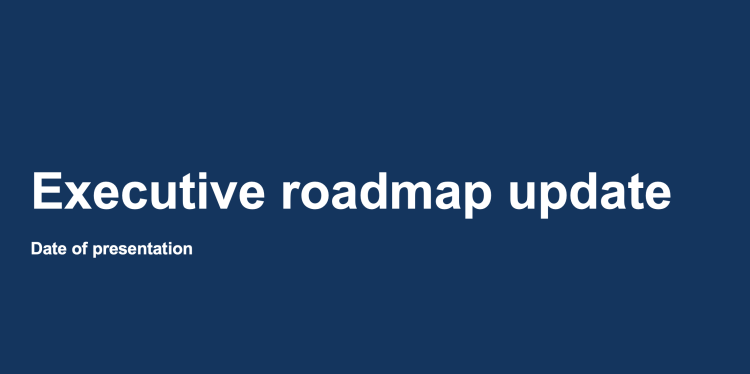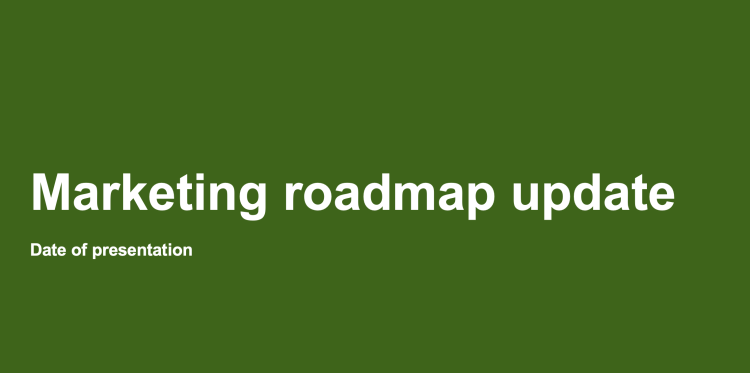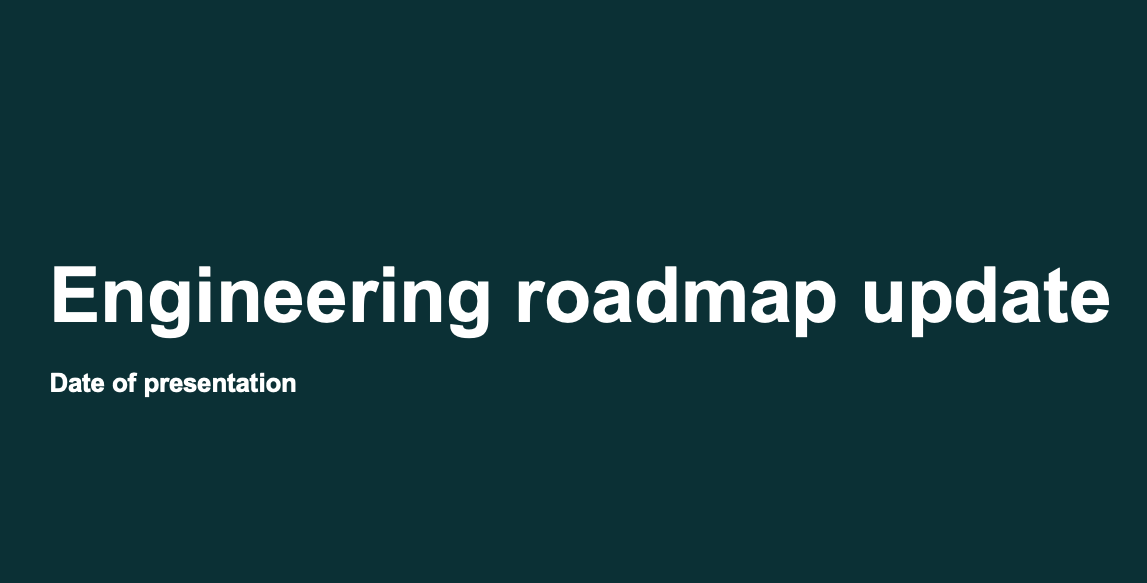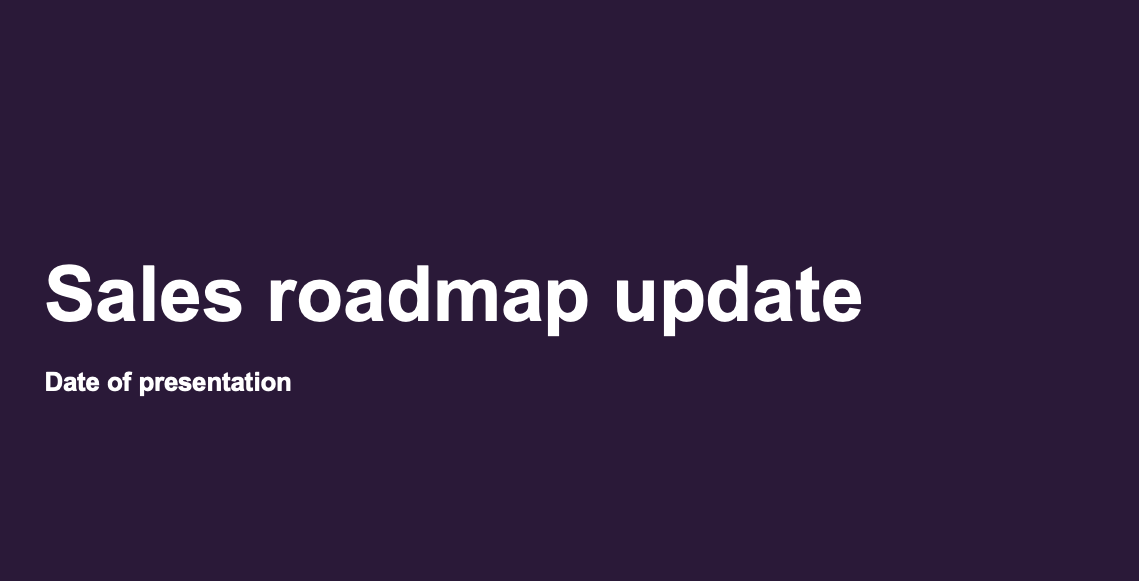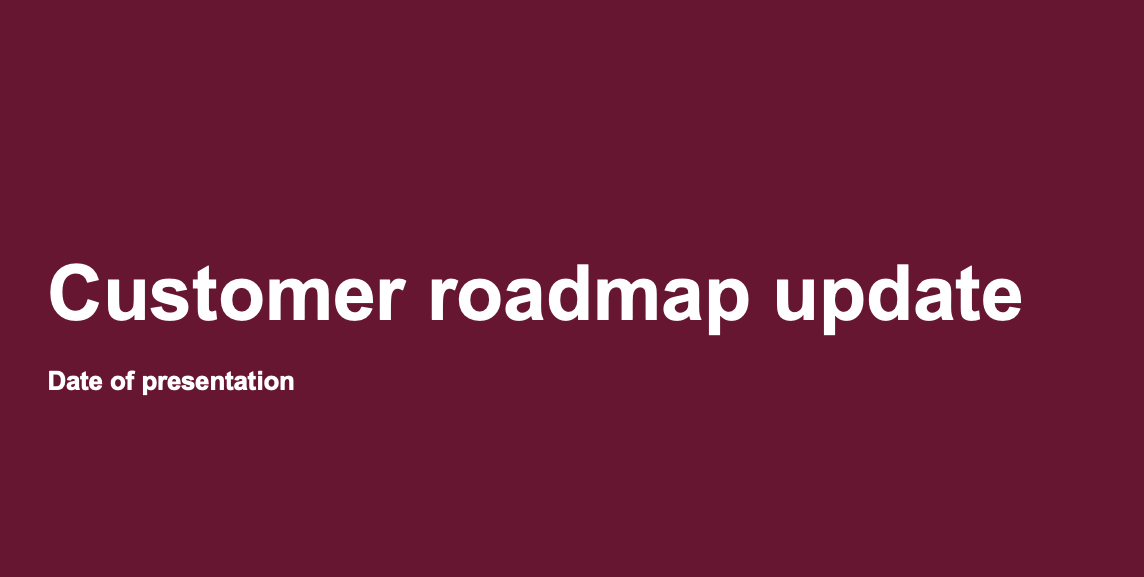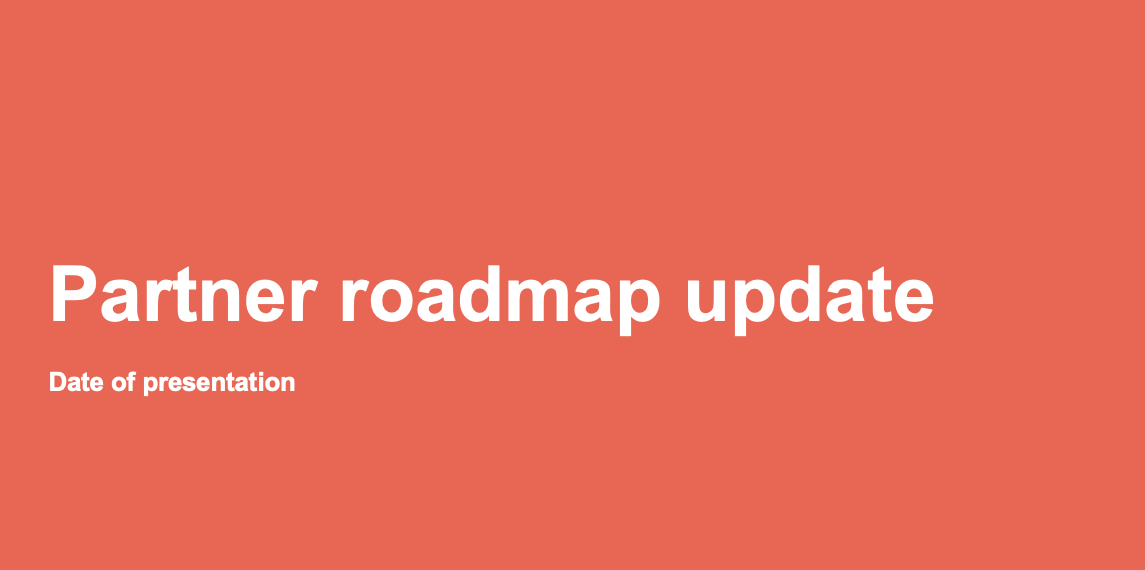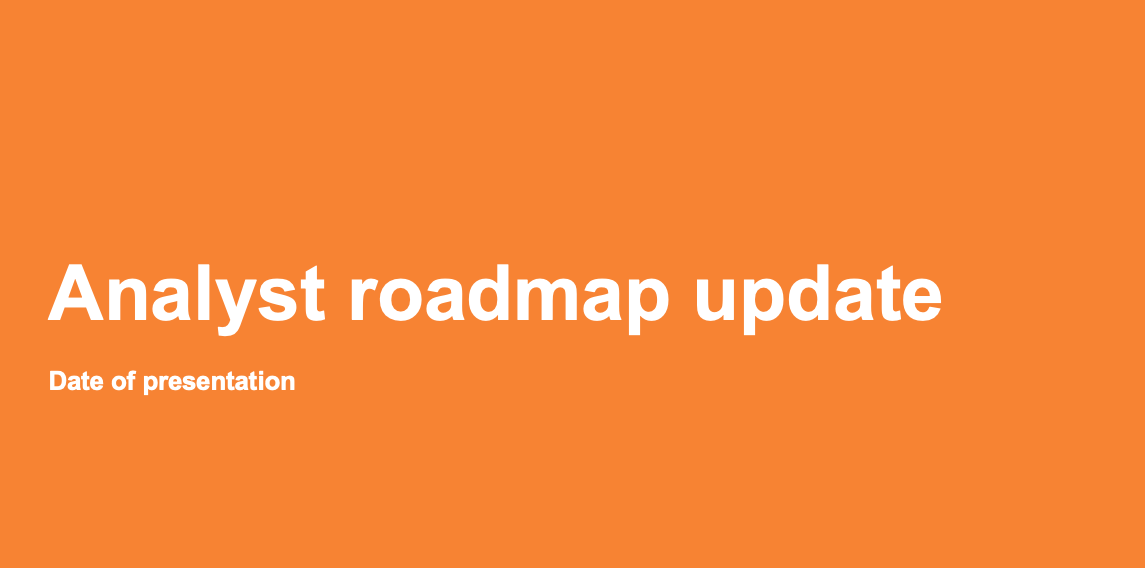8 product roadmap presentation templates
The best presenters tell a compelling story. They lead audiences through a clear, logical explanation of concepts and bring data to life by connecting it to real-world use cases and examples. Roadmap presentations are the perfect opportunity to share what is coming next for your product in an engaging and memorable way. After all, you have an invested audience and you get to share where your product is headed — the inspiration for new features and updates, what your engineering team will get to build next, and how this work will bring value to the business and customers alike.
Build a roadmap presentation in Aha! Roadmaps — free for 30 days.
This guide will walk you through how to create your own winning roadmap presentation so you can clearly communicate the why, what, and when of upcoming product work. You can even kickstart your presentation prep by downloading a roadmap presentation template configured for one of seven different audiences. Whether you are presenting to executives or customers, the tips in this guide will get you started on the right track.
Jump ahead to any section:
What is a product roadmap presentation?
Building and presenting a product roadmap is an essential part of a product manager’s job. A product roadmap presentation informs stakeholders inside and outside the company where the product is headed and how you will get there. It is your opportunity to share product plans and explain how core initiatives and features map to the company’s strategy. Most importantly, you will show how the updates you are planning will delight customers and further differentiate the product.
Of course, before you put together a roadmap presentation, you must first build your roadmap. You can choose a robust roadmapping tool like Aha! Roadmaps or use a lighter weight solution such as a virtual whiteboard.
Try a lightweight roadmap in Aha! software. Sign up for a free trial.
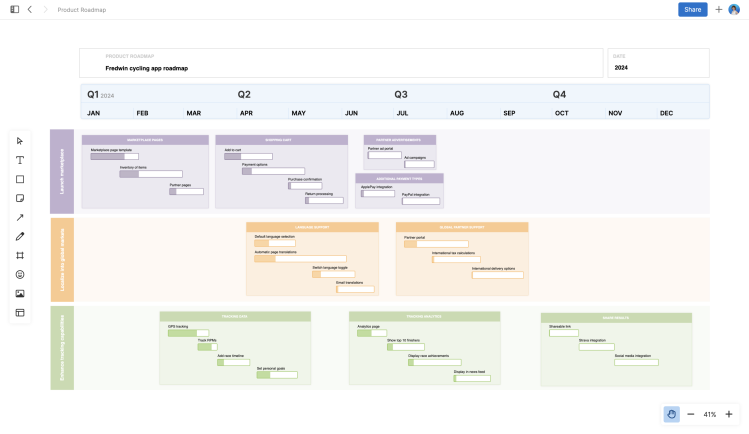
How do product managers use product roadmap presentations?
Product managers use roadmap presentations to communicate with a range of audiences — from executives to customers to engineering teams. Your presentation can be tailored to deliver different messages to your various audiences depending on the information you cover.
For example, you might use the presentation to show company leaders how major product themes or initiatives roll up into company-wide strategic efforts. Or you might want to show customers and partners what to look for in the next release. Internally you might need to highlight the timing of important customer needs and feature requests to engineering teams.
But roadmap presentations are about more than just timelines and features. They facilitate opportunities to open up dialogue, answer questions about product direction, and listen to feedback. You need to go beyond giving product updates — demonstrating why the updates matter and how they will make a real difference for your customers.
You can create presentations in Aha! Roadmaps. Pull in live views and your data will stay up-to-date.
What are the elements of a product roadmap presentation?
The best product roadmap presentations are designed to both communicate and persuade. Here are some essential elements to include and plan for in any product roadmap presentation:
Presentation element | Description |
Agenda | Just as the product roadmap shares the direction of the product, your presentation itself needs a direction too. Create and share an agenda to:
|
Purpose | Good product roadmap presentations start with a goal. Build your presentation with a goal-first approach by asking yourself:
|
Vision | Show your product plans in the context of the broader product strategy and direction. The roadmap presentation connects the work to the strategy and explains the “why” behind the plan. Consider including high-level product vision information such as:
|
Audience | Presentations should be customized according to the audience and intended outcome. Include for internal presentations:
Include for public-facing presentations:
|
Roadmaps | The roadmap is the crux of the product roadmap presentation. Product managers may choose to use multiple roadmap templates at varying levels of detail. These will be customized by audience. For example:
|
Feedback | Presenting a product roadmap gives the product manager an opportunity to answer questions and get valuable feedback from both internal and external audiences. Make sure to:
|
Shareability | Some people in your audience may want to review the presentation, either before or after you meet with them. For this reason it is important to consider shareability. Consider:
|
Roadmap presentation templates
There is no such thing as a "one size fits all" presentation template. Each presentation should be created with a specific audience in mind. Start by identifying your audience. Then identify your goals, how you will tie the roadmap to the broader product vision, and which roadmaps you will share.
Here are a few examples of roadmap presentation templates and guidelines for deciding what to include in your presentation:
Presentation slides template
This presentation template was created by Aha! product experts to help you showcase your plans. While the rest of the templates below are intended for specific audiences, this set of slides is easily customizable for any audience. It includes pre-built slide formats for strategic goals, key metrics, and of course, your roadmap. This template is available in Aha! software.
Roadmap presentation template: Executives and advisory boards
Who is the presentation for? | Executives and advisory boards |
What are your goals? | Communicate high-level themes — product direction, investment areas, and release timelines across products |
How does it connect to the broader vision? | Show the relevance to your company’s strategy — the market landscape, business model, and goals and initiatives |
What roadmaps should you use? | Include high-level views — portfolio view showing planned releases mapped to products and strategic initiatives |
How should you customize your roadmaps? | Show general information — timelines for major bodies of work |
How widely should the presentation be shared? | Limit sharing — mark as confidential and update quarterly |
Roadmap presentation template: Marketing team
Who is the presentation for? | Marketing |
What are your goals? | Communicate cross-functional factors for go-to-market planning |
How does it connect to the broader vision? | Connect to product strategy — goals and initiatives, competitors, personas |
What roadmaps should you use? | Include planned work — quarterly initiatives roadmap that highlights goals |
How should you customize your roadmaps? | Highlight time frames — features and releases |
How widely should the presentation be shared? | Limit sharing — mark as confidential and update according to release status |
Roadmap presentation template: Engineering and IT teams
Who is the presentation for? | Engineering and IT |
What are your goals? | Communicate timing — capacity planning estimation |
How does it connect to the broader vision? | Connect to product strategy — goals and initiatives mapped to planned features |
What roadmaps should you use? | Include planned work — features roadmap sorted by type, showing status with internal release dates |
How should you customize your roadmaps? | Highlight details — information about features, release dates, and requirements |
How widely should the presentation be shared? | Limit sharing — mark as confidential and update according to release status |
Roadmap presentation template: Sales and support
Who is the presentation for? | Sales and support |
What are your goals? | Communicate timing to help close deals and support customer retention |
How does it connect to the broader vision? | Customer and partner details — initiatives mapped to release phases |
What roadmaps should you use? | Include planned work — release roadmap with phases and dependencies for cross-functional efforts |
How should you customize your roadmaps? | Highlight time frames — features and releases |
How widely should the presentation be shared? | Limit sharing — mark as confidential and update according to release status |
Roadmap presentation template: Customers
Who is the presentation for? | Current and prospective customers |
What are your goals? | Communicate product direction — upcoming functionality and major themes |
How does it connect to the broader vision? | Customer-centric details — initiatives mapped to release phases |
What roadmaps should you use? | Include planned work — custom roadmap showing major milestones and idea prioritization |
How should you customize your roadmaps? | Show general information — quarterly release dates |
How widely should the presentation be shared? | Semi-public — gate as needed and update quarterly |
Roadmap presentation template: Partners
Who is the presentation for? | Partners |
What are your goals? | Communicate product direction — upcoming functionality and major themes |
How does it connect to the broader vision? | Partner-centric details — initiatives mapped to release phases |
What roadmaps should you use? | Include planned work — features roadmap filtered to show partner-centric planned work with external release dates |
How should you customize your roadmaps? | Show general information — quarterly release dates with dependencies |
How widely should the presentation be shared? | Confidential or semi-private — gate as needed and update quarterly |
Roadmap presentation template: Analysts and media
Who is the presentation for? |
|
What are your goals? |
|
How does it connect to the broader vision? |
|
What roadmaps should you use? |
|
How should you customize your roadmaps? |
|
How widely should the presentation be shared? |
|
Tools to build roadmap presentations
Every product roadmap presentation will have a specific purpose guided by its target audience. However, building many customized presentations can be a time-consuming process.
Consider using roadmapping software to centralize your product planning and feature definition. You may need to aggregate information from multiple sources to create your roadmap presentation — spreadsheets, documents, other presentations, and design tools. Software purpose-built for product management makes it easier to share product roadmap plans securely with a target audience.
Regardless of how you create your roadmap presentation, the most important thing is to focus on your audience and your goals. This will allow you to clearly communicate the features and timelines of your roadmap. You will also demonstrate the "why" at the center of it all — how the product will deliver value to your business and your customers.


